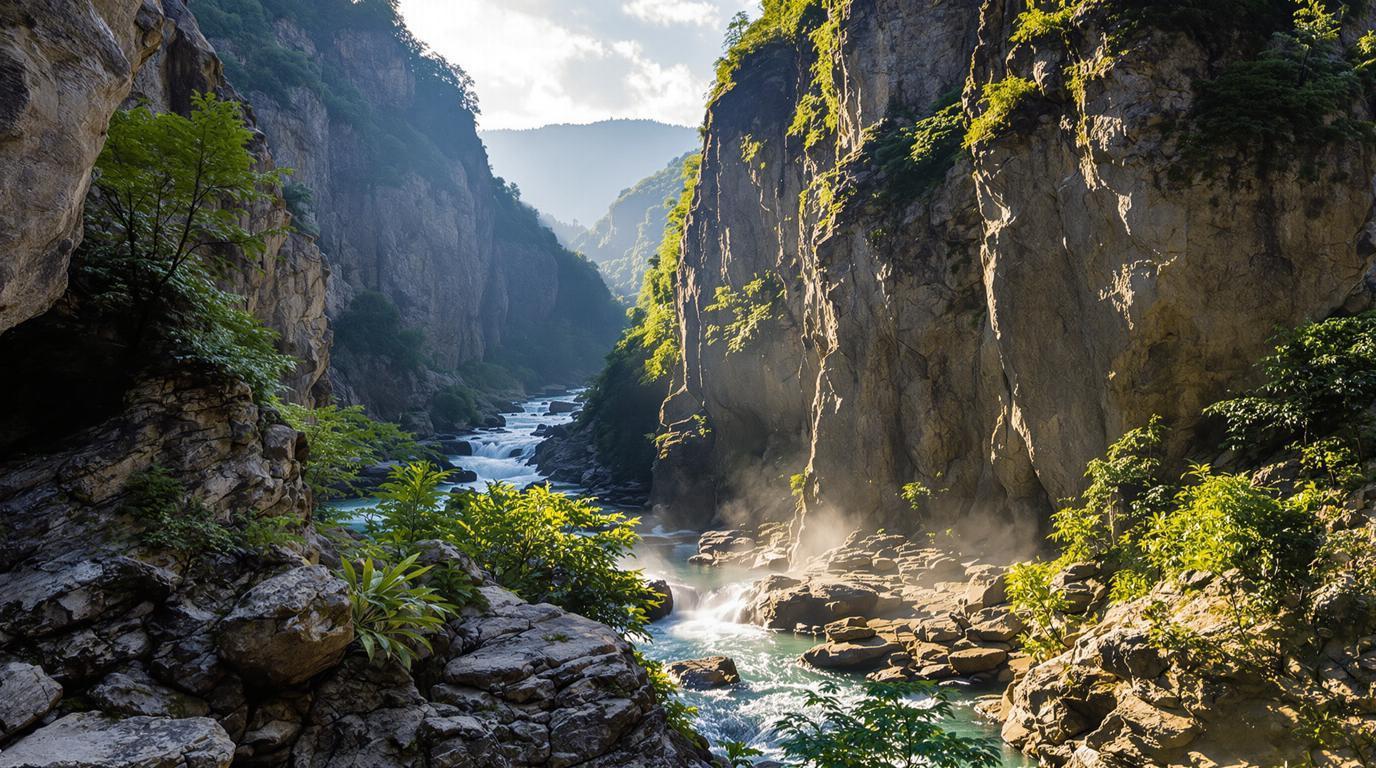The towering sandstone cliffs of New River Gorge rise from morning mist like Colorado’s Front Range, but without the altitude sickness or $400-per-night hotel bills. Last summer, I discovered this 2,887-resident town tucked into West Virginia’s Appalachian folds, where whitewater rapids thunder through ancient canyon walls and rock climbers scale vertical faces that rival anything in Boulder. The locals call it “East Coast Colorado,” and after spending weeks exploring both regions, I understand why this comparison isn’t just local pride—it’s geological truth.
Fayetteville sits at the edge of America’s newest national park, where the New River has carved a 1,000-foot-deep gorge through 300-million-year-old rock. The dramatic landscape mirrors Colorado’s outdoor playground, but with 60% lower costs and crowds that haven’t discovered this Appalachian secret yet.
What struck me most wasn’t just the visual similarity to Colorado’s canyon country, but how authentic mountain culture thrives here without the commercial veneer that now defines many western destinations. This Tennessee covered bridge town reveals similar Appalachian authenticity that’s vanishing elsewhere in America.
The Appalachian canyon that rivals Colorado’s geology
Ancient rock formations hiding modern adventures
The New River Gorge’s sandstone and limestone layers create climbing routes that match Colorado’s difficulty and beauty at half the guide fees. Where Colorado charges $200-300 for guided climbs, Fayetteville’s local outfitters offer full-day experiences for $150-200. The rock quality here actually surpasses many Colorado destinations—these 300-million-year-old formations provide bomber holds and crack systems that have attracted climbers from Yosemite’s big walls.
Whitewater that flows year-round
Unlike Colorado’s snowmelt-dependent rivers, the New River maintains consistent Class III-V rapids through summer and fall. Where Arkansas River rafting costs $120-180 per person, Fayetteville’s half-day trips run $80-120. The Lower New River’s Keeneys Rapids and Upper Railroad create technical challenges that rival Colorado’s Royal Gorge, but guides here share stories of Civil War history instead of mining booms.
The outdoor playground tourists haven’t discovered
Bridge Walk experiences Colorado can’t match
The New River Gorge Bridge rises 876 feet above the river—higher than most Colorado highway bridges—and offers guided catwalk tours beneath the span. This $75 experience provides perspectives impossible in Colorado’s more regulated environment. During Bridge Day each October, BASE jumpers leap from this span in an event that draws fewer crowds than Colorado’s typical summer weekend.
Mountain biking trails without lift ticket prices
Fayetteville’s Arrowhead Trails and Cunard systems offer 50+ miles of singletrack through hardwood forests that change dramatically with seasons. Unlike Colorado’s $60-80 lift-accessed trails, these routes cost nothing beyond parking. The technical challenges match Colorado’s difficulty, but you’ll encounter salamanders and wild turkeys instead of marmots and pikas.
The authentic mountain town experience Colorado has lost
Local culture that hasn’t been commercialized
Cathedral Cafe serves $12 breakfast plates that would cost $20 in Vail, while local guides share family stories dating back generations. The town’s authenticity stems from its isolation—no major interstate connects here, keeping development pressures minimal. This South Carolina marshlands town maintains similar authenticity through geographic isolation.
Travel Note: “The difference between Fayetteville and Colorado isn’t just cost—it’s authenticity. Here, your climbing guide’s grandfather probably worked these mountains, and the stories they share come from lived experience, not tourism training manuals.” – Local outfitter with 20 years guiding experience
Seasonal advantages Colorado can’t offer
July temperatures here average 82°F—warmer than Colorado’s mountain towns but with swimming holes for cooling off. The humidity creates afternoon thunderstorms that clear quickly, leaving crisp evenings perfect for campfires. Unlike Colorado’s unpredictable mountain weather, Fayetteville’s climate allows reliable outdoor planning.
Insider access to America’s newest national park
Lodging and dining that won’t break budgets
The Adventures on the Gorge resort offers riverside cabins for $180-250 per night—comparable accommodations in Colorado run $300-500. Local restaurants like Secret Sandwich Society serve craft beer and regional cuisine at prices that would seem impossible in Aspen or Telluride. Colorado’s twin lakes region offers similar mountain beauty but at premium prices.
Access without the altitude adjustment
At 2,000 feet elevation, visitors avoid Colorado’s altitude sickness while enjoying mountain scenery. The drive from major eastern cities takes 4-6 hours versus flights to Denver plus mountain driving. This accessibility factor alone saves hundreds in travel costs.
Frequently Asked Questions
How do adventure costs compare between Fayetteville and Colorado?
Fayetteville’s guided activities cost 40-60% less than Colorado equivalents. Whitewater rafting runs $80-120 versus Colorado’s $120-180, while rock climbing guides charge $150-200 compared to Colorado’s $200-300 range.
What’s the best time to visit for outdoor activities?
April through October offers ideal conditions, with July and August providing warmest water temperatures for rafting. Fall colors peak in mid-October, coinciding with Bridge Day celebrations.
Can beginners enjoy the same activities as Colorado destinations?
Yes, local outfitters offer beginner-friendly options on Upper New River rapids and easier climbing routes. The learning curve feels less intimidating than Colorado’s high-altitude environments.
This Appalachian gorge town offers Colorado’s outdoor thrills without the commercial overlay that’s transformed western destinations. As more travelers discover Fayetteville’s authentic mountain culture and dramatic landscapes, the window for experiencing this unspoiled gem continues narrowing. The question isn’t whether this secret will eventually spread—it’s whether you’ll discover it before the crowds arrive.
